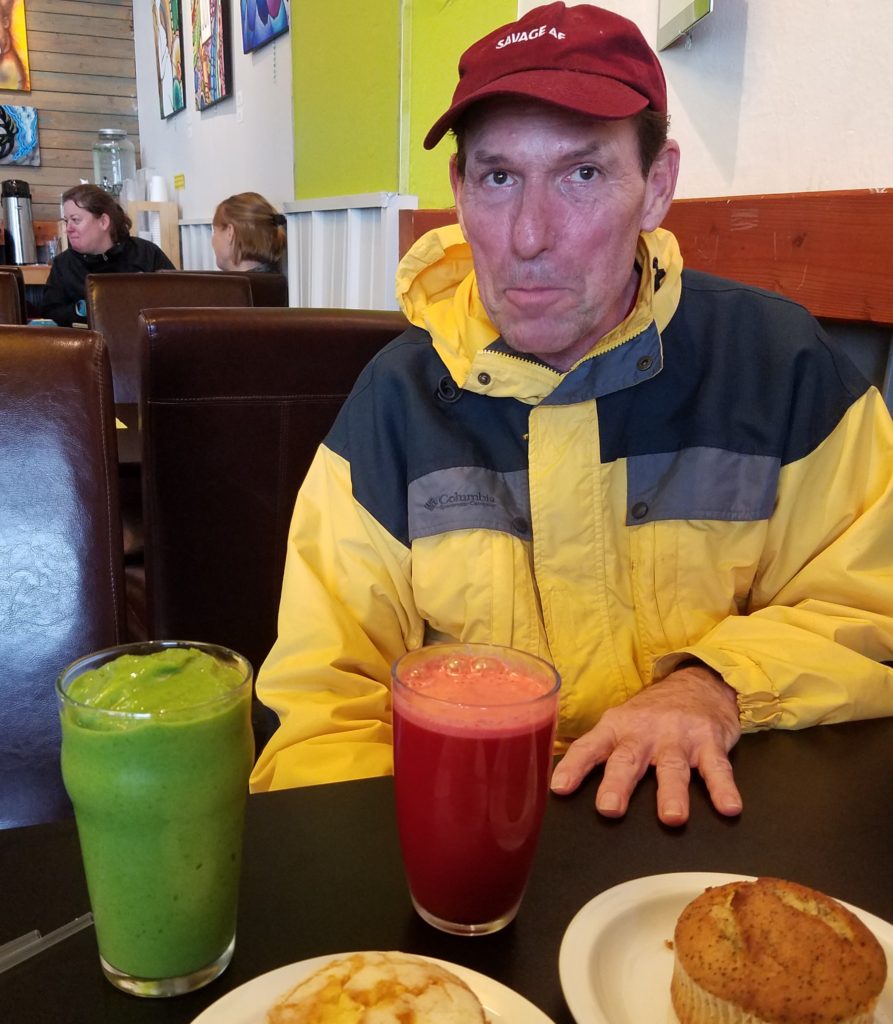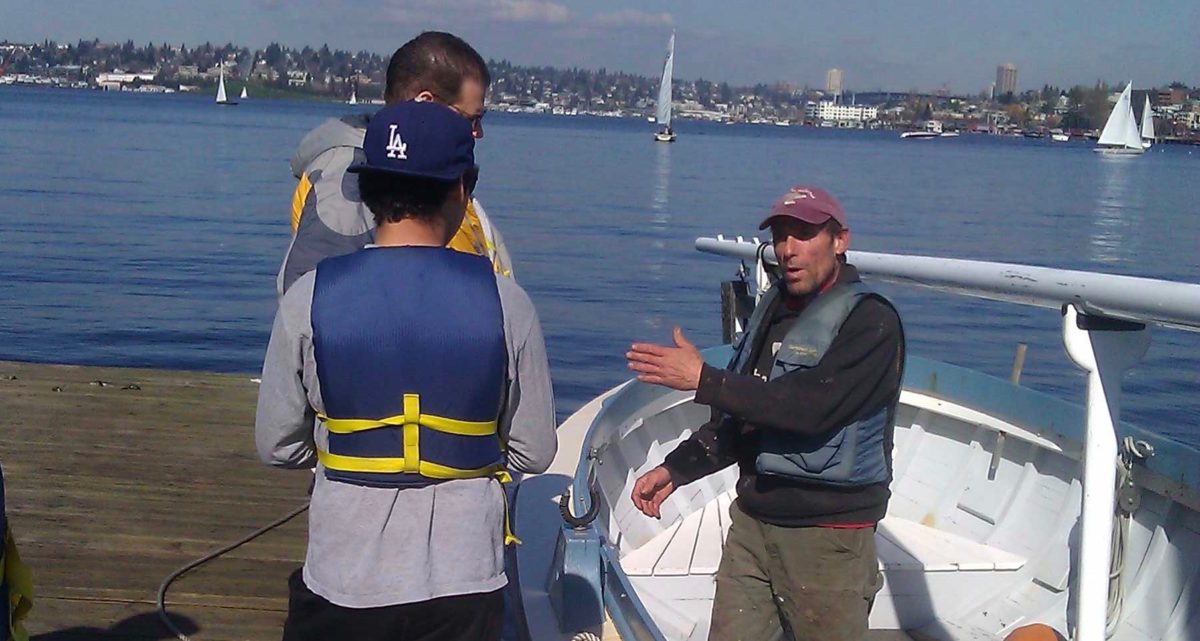Decatur, GA, 24-Jan-2019 – Jennifer and I flew from Seattle to Atlanta yesterday. We had traveled by bus and ferry from Port Townsend to Caro Babbo, on Lake Union, the day before.
Owning Caro Babbo introduces us to a greater cross section of the world than anything I have ever done.
We meet people who have bought new power boats for millions of dollars and people living on derelict sailboats that will never move again without a tow. Unlike doing business in New York or the third world where the mega-wealthy and the destitute live side-by-side, sailing Caro Babbo, we do not merely see the spectrum of wealth and social standing, we spend time with the socio-eco spectrum of mankind.
I lived in NYC during the dark Abe Beam years. The city was at its nadir: murders were around four per day. It was dangerous time, and a time to learn about people and gain street smarts.
Jennifer and I generally catch the 5:56am bus from Port Townsend when we travel to Seattle. It is commuters and others making the 2-1/2 hour run. Port Townsend’s homeless and street people are asleep.
For this trip, we caught the 10 am #7 bus.
In 1978, or so, a blind beggar sat against a building wall on the sidewalk in New York City’s west 30s begging. He had a handwritten sign that stated the obvious, a church-offering basket in his lap with some bills and mostly change, and, by his left hand, a sandwich of two pieces of white bread with a slice of orange cheese between the slices. The bread had started to dry out, the top pieces curled upward. The sandwich was cut on the diagonal.
With his back against the wall so that he laid on his right side, a wretch, there is no other word, slithered towards the blind beggar. With an outstretched hand the wretch reached for the blind man’s sandwich.
I did nothing; I couldn’t decide who was in greater peril.
The image, and my indecision, has never left me.
At the Port Townsend bus stop, Jennifer and I sat in the enclosure out of the wind. A man sat on a flattened cardboard box on top of the bench across from us. His clothes were clean, but he’d clearly spent the previous night in the shelter. Another man came by; they discussed the weather and other topical things. A woman, who seemed to know them, came by and asked for loan. The men said no. After a few minutes the trio decided to walkover to the Safeway supermarket and left.
In the open part of the bus stop another group, talking loudly, was whirled through and in front of by a very tall, blonde, pointy-faced, outrageous man pontificating and making pronouncements. When I glanced over for a few moments, he saw me watching and made a slicing motion across his throat before returning to his performance.
A woman in her fifties broke from the group, came into the shelter and pronounced it much warmer. She called to the group, who chose not to, or did not hear her. After a few minutes, she announced she was going to the ‘‘rest room,’’ and walked over to the bus station office leaving her purse and a small bullet bag on the bench.
I quietly pointed out the blonde man to Jennifer and said, ‘‘He’s a street hustler.’’
I didn’t give the woman in her fifties’ belongings any thought. I don’t know why I didn’t do anything to protect them. As we were leaving the shelter, I said to Jennifer, ‘‘This guys a thief. He’s going to steal her stuff.’’
As the bus pulled out, Jennifer called to me, ‘‘You were right. Look, he’s going through her stuff.’’ The blond man looked up at the bus and made eye contact with no conscience, just a cold evaluation: prey or threat? On the bus we were neither. He continued to paw though her belongings.
I asked Jennifer, why didn’t I carry her belongings into the office? I knew what was going to happen. She had no answer, and neither did I.

In 2010, or so, Jennifer and I met John Riley at the Center for Wooden Boats (CWB) on Lake Union. John lived aboard his sailboat, Daisy, and exchanged night watchmen duties, labor and expertise for dock space. John skippered boats, kept boats going, and evaluated new volunteers (like us).
Before we started to volunteer, I met John for the first time one day at CWB when John called out to the group at large, can anyone do an eye-splice? I spliced together a snotter that holds a spar to the mast on a Bristol Bay Gillnetter.
We became friends, but upon that first meeting I knew John had lived out of doors. It leaves a mark that doesn’t go away.
We have never seen John intoxicated, but I once made the mistake of paying him $200 in cash, which never made it to the next day. John’s relationship with CWB ended when, fueled with liquid courage, John expressed his opinion at a social event with board members in attendance.
John had been a printer. He and I would tell stories about the industry and the favorite brands of printing presses we’ve worked with.
John has only lived aboard and in shelters the entire time I know him. Time in a shelter is a time to save money.
We lost touch for while.
Last July (2018), I tracked John down. He’d had a stroke the previous January. After his family and doctors wrote John off as living dead, John came back, partially paralyzed and somewhat aphasic. Both passed with time. He tells me they threw him out of rehab when they found he was making trips to Burger King for a fellow patient who couldn’t get there himself.
We saw John, finally, when we returned in December. He was the same man we knew: a little less steady on his feet, and with a tremolo in his voice, but affectionately known by the staff at the tea shop where we met in Tacoma. He told them, ‘‘See, I do have friends!’’ At the YMCA, it was the same.
The day before yesterday, we realized we’d be in Seattle at the same time. John met Jennifer and me at Caro Babbo. He was more cautious boarding, but did so with no problem. Settling into the starboard settee, next to Jennifer and across from me, he leaned his head back and said to the headliner, ‘‘A boat, a boat!’’ We all laughed.
John had just seen a hand doctor. The problem with his hand was not stroke related. With some small surgery and some physical therapy, John thinks he might start working again.
If that happens, ‘‘I might go back into the shelters,’’ to save up money to buy another boat. His was sold while he was recovering.
Using a Trumpian adjective, John complained seriously with an intentionally comic affect that he would die if he stayed long term in the facility where he is now living.
By 6pm, it was dark. John decided that he should get started on the 90-minute journey back to Tacoma. Carrying his backpack, John climbed the forty-three stairs to Nickerson St to catch the number forty bus home.
At 4am the next morning, Jennifer and I buttoned up Caro Babbo once again and took an Uber to SeaTac.


Good story. Want to meet for lunch while you are in Atlanta?
Sure. We’re in Florida attending the very last Newspaper Vendors Group meeting that Bill Solimeno is hosting. We get back to ATL at the end of next week. In town until early March. What does the week of the 11th look like?